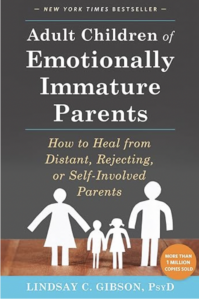What's On This Page?
ToggleHello friends, I am excited about this blog! I recently finished a book that left a deep and lasting impression on me, about people who are emotionally immature, not necessarily parents although that’s the title of the book I’ll tell you about shortly. Today I wanted to share it with you in case it applies to you as an “adult child” of an emotionally immature parent (or other person in your life).
I don’t want to give too much away about my own life so I will refrain from using my own specific life examples but suffice it to say this book stuck a deep chord because I recognized several people in my life like within my family, ex-employees and others along the way.
Maybe you know someone who is emotionally immature, but you haven’t considered what that means exactly? As a pharmacist, I’m aware of the popularity of anxiolytic drugs and antidepressants. I’ve never used any medications even though I have dealt with some challenging people in my life, however, these drugs are blockbusters because many people can’t cope.
Millions of people need something to help them cope with people in their life. It’s sad to think that some of your friends and relatives may be relying on those prescription drugs, weed or alcohol, in order to deal with people in their life… more specifically because someone in their life is emotionally immature.
As it pertains to alcohol, I don’t recommend this as a method to numb the pain from difficult relationships. So many times, a parent or a child may lean on a family member so hard that it literally drives them to drink or do drugs as an adolescent. Do you know someone who started numbing themselves early on? I wrote an article on my alcohol because it touched my family too, My Brother Was a Secret.
One other thing, drugs come with side effects, you know this if you have a copy of my book Drug Muggers. Here’s an article on 6 Surprising Reasons that Drug Muggers Zap Zinc.

The Book
Back to the point of this blog, I am proposing this to you: It’s possible if you’re dealing with someone who is emotionally immature and you don’t know it yet! I just learned about this topic in a book. I’m an avid reader and will read 5 – 6 books a month sometimes, and by “read” I mean either read, or audible them.
Lindsay C. Gibson’s book Adult Children of Emotionally Immature Parents: How to Heal from Distant, Rejecting, or Self-Involved Parents truly resonated with me. It’s an insightful guide that helps unravel the emotional dynamics of relationships—whether those be with a parent, spouse, colleague, or anyone in your life who may exhibit emotional immaturity. I didn’t “read” it, but rather used Audible and enjoyed every word of this book as it was conveniently narrated to me. So much so, that my amazing and brave (second) husband Sam (who is definitely emotionally mature) listened to it with me the second time around! We love this book.
This book was both eye-opening and healing, and I couldn’t help but reflect on how these concepts apply to me and my interactions with certain people over the past few decades, starting with childhood.
I want to give hope to you in case you might be dealing with feelings of confusion, exasperation, frustration or anxiety with someone you love, or know.
The book gently lays out why emotionally immature people behave as they do, and how it can deeply impact those close to them, especially their children. Maybe you had perfect, emotionally mature parents, and if so you may not think you need to read this book. But it’s not necessarily about a parent.
If you read it, you can replace the word “parent” with any number of individuals you know. Let me ask you some questions before we move on.
Answer these Questions for Yourself
When you open up about feeling upset or overwhelmed in your life, does your parent say things that seem surface-level, brush you off, or even react sarcastically?
Do conversations with your parent seem to be mostly about him/her, their own stories, or what they’re interested in—making it hard for you to share your own thoughts and feelings?
Do you frequently get interrupted? It’s as if what you have to say is not important to them.
Do you often feel like the roles are reversed, where you end up being the parent in the relationship instead of the child?
How does your parent react when you disagree with her or him, even politely? Does it seem like even the smallest disagreement puts them on the defensive?
When you have something to celebrate or exciting news, does it feel like your parent truly cares and wants to know more… or do you walk away feeling deflated, like it didn’t matter that much?
Do you notice that your parent often prioritizes their opinions over facts and logic, even when presented with clear evidence or different perspectives?
Is self-reflection absent or unusual? In other words, does she/he find it impossible to see their own role in a conflict? It is like everything is someone else’s fault. This is a classic sign of an emotionally immature person.
Your parent (or person) doesn’t have to exhibit ALL of these traits. Even if you find that a couple of these things resonate with you, it could be a sign that their emotional immaturity is affecting your relationship.
I have a few more questions to ask you down below, because there are more hallmark characteristics of an EI (emotionally immature) parent down below. But you get the point right now so let’s move on for a few minutes.
If Not a Parent, Then Who Else?
In addition to parents, other emotionally immature individuals in your life could include:
- Sibling
- A Boss or Superior
- Spouse/Partner
- Friend
- Coworker
- Extended Family (Aunt, Uncle, Nephew, etc)
- Teacher
- Roommate
The frustration doesn’t have to be encountered on every front. While we can’t change a parent’s level of emotional maturity, we do have control over the friends and relatives we choose to surround ourselves with. You don’t have to repeat a pattern in an adult relationship. While it may seem obvious, it’s a good time for the reminder: We can all choose to break the cycle by intentionally selecting emotionally mature people in our life and limiting time with those who are not.

The Importance of Understanding Relationships
For me, reading Lindsey’s book felt like a relief. I finally understood so much of the emotional disconnect I’d experienced. It’s not just about parenting—it’s about relationships, period. You don’t need to feel alone anymore if you’ve ever struggled with these kinds of relationships.
The book dives deep into the concept of emotional immaturity and offers insights into the different types of emotionally immature people. These aren’t limited to just parents; they can be anyone in your life.
From those who avoid conflict to those who are driven by their own needs for success, emotionally immature individuals often create relationships fraught with challenges. You might feel a sense of emotional emptiness, anxiety, or even people-pleasing tendencies that stem from this dynamic.
Speaking of anxiety, you may be interested in my other blog, 5 Key Neurotransmitters and 8 Solutions for Anxiety: Cure the Worry!
Audible Option: Healing at Your Own Pace
I read a lot. Being a bookworm myself and an author, I usually go through multiple books each month. And while this one captured my attention, I know reading might be challenging for some people. That’s why I recommend the Audible version for anyone who prefers listening over reading. It’s an excellent option, especially when you’re navigating something as emotionally charged as this. Listening can make it easier to digest the heavy content without feeling overwhelmed.
Understanding Emotional Immaturity Without Giving It All Away
One of the reasons this book struck a chord with me is that it explains how emotionally immature people (whether parents, bosses, or spouses) operate, without being overly simplistic. The author, Gibson, talks about four main types of emotionally immature people: emotional, driven, passive, and rejecting. Their behaviors may seem confusing, but when you understand how their emotional immaturity influences their actions, it becomes easier to move forward without carrying all that baggage yourself.
I won’t spoil all the good parts because honestly, the best way to absorb this information is by reading (or listening) to the book yourself. However, what I can say is that this knowledge can help you avoid needing certain crutches—whether that’s prescription anxiety meds, antidepressants, weed, or even alcohol. You might discover that the root of your emotional struggles isn’t with you at all but with the influence of someone else who may be emotionally immature. Understanding this could change your life, and help you take healthier paths to manage stress, anxiety, and emotional disconnect.

Recognizing the Impact
You’ll learn how this emotional immaturity—whether from a parent or someone else—affects your own behavior, such as feeling unworthy, anxious, or constantly needing to please others. The weight of always trying to “make things right” can be exhausting.
The good news is that once you understand what’s happening, you can start making shifts. Setting boundaries, developing emotional intelligence, and surrounding yourself with healthier relationships become possible.
While this book mainly focuses on the parent-child dynamic, the insights extend to any close relationship where emotional immaturity is a factor. Whether you’re dealing with a difficult boss, a frustrating spouse, or someone else, this book gives you the tools to better navigate those relationships without letting their issues take a toll on your emotional health.
More Characteristics of an Emotionally Immature Parent- Is This True for You?
At the outset of my article, I posed a few questions for you to see if you might be interacting with an EI individual. Dr. Lindsey Gibson explores this fully in her remarkable book on the topic which you can buy on Amazon. I have a few more things to ask you in order for you to recognize an emotionally immature parent.
- Does your parent tend to overreact to relatively minor things, making a mountain out of a molehill?
- Do you feel like they have no empathy or emotional awareness, so you walk away feeling misunderstood?
- When it comes to emotional closeness, is it kind of lacking? Like, your parent seem uncomfortable or unwilling to “go there,” avoiding deep conversations and feelings?
- Do they get irritated by a difference of opinion, making you feel like it’s useless to share your own perspective. You just tend to ‘yes’ them or say ‘mhm” a lot.
- Growing up, did he/she confide in you about their own life issues but gloss over your own.
- Have you noticed they do stuff, or make decisions without empathy, or consideration for how another person might feel about it. It’s all about them.
- Was it hard to get attention or sympathy unless you were really sick or in a crisis? An emotionally MATURE parent/person will willingly offer attention during your times of need and not wait for you to be in serious crisis because they are empathetic.
Remember, not all of these traits have to fit for you to recognize an emotional immature person. Even if just a couple of things resonate, it might be a sign that emotional immaturity is affecting your relationship.

Healing Is Possible
One thing I appreciated is how the original book offers steps for healing, and the “Disintengling” book which I think is her third book is even better. The problems are shared, but the books help you navigate a solution. Building your emotional intelligence, setting boundaries, and choosing healthier relationships are all part of the journey. Detachment may be necessary, as in divorce, geographical separation or complete estrangement. Some people do not want to detach, or simply cannot for whatever reason.
I found the suggestions offered practical and empowering, especially if complete estrangement or disengagement is not desired, or impossible. There are ways to reclaim your emotional well-being, especially when you’ve spent years, maybe even decades, feeling gaslit and invisible.
A Way Forward
This book gave me a fresh perspective and made me realize I wasn’t alone, and I wasn’t the one who was crazy. It’s helpful to finally understand the root problem of the relationship hurdles that I experienced with certain people throughout my life. It explains my need to set boundaries, fire some employees, and detach completely from other relationships that didn’t work well.
Although it’s embarassing to share that some of these insights came from reflecting on my personal relationships, I tell you because I believe that having this awareness can be transformative for you too. I used Audible to listen to the book which I enjoyed very much. The narrator has a lovely voice and hearing the spoken words was better for me than reading them.
If you’ve ever felt like something is holding you back in your relationships—whether with a parent, partner, or co-worker/boss, this book will shed some light. It’s a gentle reminder that you can heal from emotional wounds, and you don’t need to feel like you’re going crazy.
I hope this book touches you the way it touched me. It’s worth every page (or listen).

Suzy Cohen, has been a licensed pharmacist for over 30 years and believes the best approach to chronic illness is a combination of natural medicine and conventional. She founded her own dietary supplement company specializing in custom-formulas, some of which have patents. With a special focus on functional medicine, thyroid health and drug nutrient depletion, Suzy is the author of several related books including Thyroid Healthy, Drug Muggers, Diabetes Without Drugs, and a nationally syndicated column.



